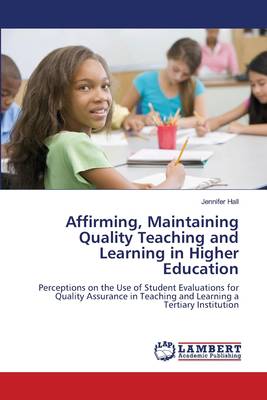
- Afhalen na 1 uur in een winkel met voorraad
- Gratis thuislevering in België vanaf € 30
- Ruim aanbod met 7 miljoen producten
- Afhalen na 1 uur in een winkel met voorraad
- Gratis thuislevering in België vanaf € 30
- Ruim aanbod met 7 miljoen producten
Zoeken
Affirming, Maintaining Quality Teaching and Learning in Higher Education
Perceptions on the Use of Student Evaluations for Quality Assurance in Teaching and Learning a Tertiary Institution
Jennifer Hall
Paperback | Engels
€ 48,45
+ 96 punten
Omschrijving
Maintaining quality in educational institutions is no different from that of industry or business.In higher education this quality has become a priority as a result of the demands from internal and external stakeholders.Quality assurance mechanisms to measure the various operations and processes have increased. In measuring their core business that of teaching, administrators in higher education use students evaluations of faculty and instruction to evaluate the effectiveness of teaching and learning.The primary purpose of this research was to explore students, lecturers and administrators perceptions on the purpose, usefulness and satisfaction with the evaluation process, and also to ascertain students views on the effectiveness of the instruction they received. Two focus group sessions comprising of six senior lecturers and four student union representatives were conducted. In measuring their core business, that of teaching, administrators in higher education use students evaluations of faculty and instruction to evaluate the effectiveness of teaching and learning.Chief among the recommendations was a need to resensitise students, lecturers, and administrators about the process.
Specificaties
Betrokkenen
- Auteur(s):
- Uitgeverij:
Inhoud
- Aantal bladzijden:
- 144
- Taal:
- Engels
Eigenschappen
- Productcode (EAN):
- 9783838330495
- Verschijningsdatum:
- 2/12/2009
- Uitvoering:
- Paperback
- Formaat:
- Trade paperback (VS)
- Afmetingen:
- 152 mm x 229 mm
- Gewicht:
- 222 g

Alleen bij Standaard Boekhandel
+ 96 punten op je klantenkaart van Standaard Boekhandel
Beoordelingen
We publiceren alleen reviews die voldoen aan de voorwaarden voor reviews. Bekijk onze voorwaarden voor reviews.











